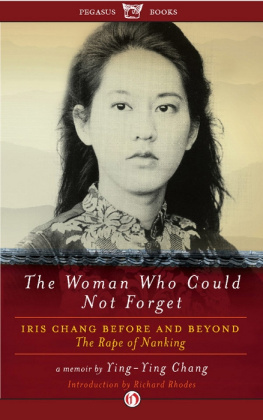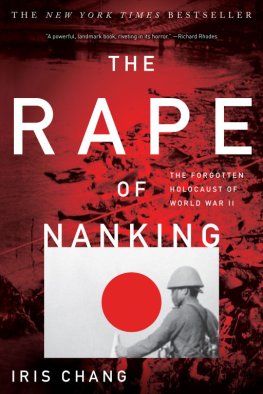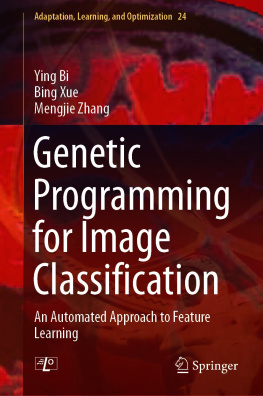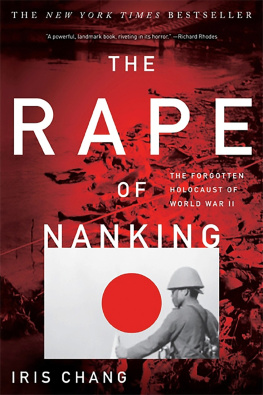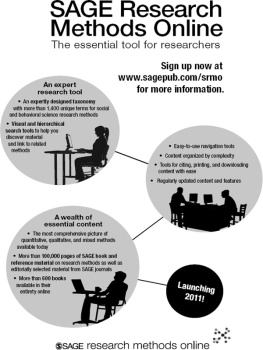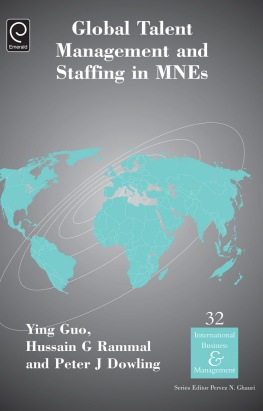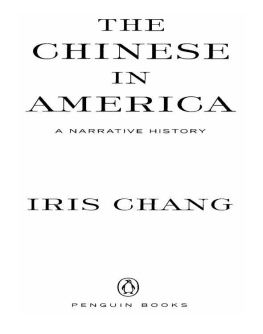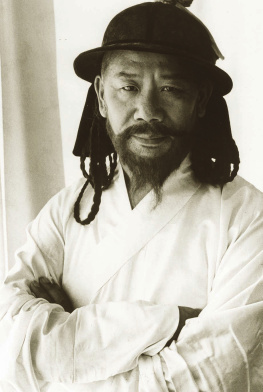Ying-Ying Chang - The Woman Who Could Not Forget: Iris Chang Before and Beyond the Rape of Nanking
Here you can read online Ying-Ying Chang - The Woman Who Could Not Forget: Iris Chang Before and Beyond the Rape of Nanking full text of the book (entire story) in english for free. Download pdf and epub, get meaning, cover and reviews about this ebook. year: 2011, publisher: Pegasus Books, genre: Detective and thriller. Description of the work, (preface) as well as reviews are available. Best literature library LitArk.com created for fans of good reading and offers a wide selection of genres:
Romance novel
Science fiction
Adventure
Detective
Science
History
Home and family
Prose
Art
Politics
Computer
Non-fiction
Religion
Business
Children
Humor
Choose a favorite category and find really read worthwhile books. Enjoy immersion in the world of imagination, feel the emotions of the characters or learn something new for yourself, make an fascinating discovery.
- Book:The Woman Who Could Not Forget: Iris Chang Before and Beyond the Rape of Nanking
- Author:
- Publisher:Pegasus Books
- Genre:
- Year:2011
- Rating:3 / 5
- Favourites:Add to favourites
- Your mark:
- 60
- 1
- 2
- 3
- 4
- 5
The Woman Who Could Not Forget: Iris Chang Before and Beyond the Rape of Nanking: summary, description and annotation
We offer to read an annotation, description, summary or preface (depends on what the author of the book "The Woman Who Could Not Forget: Iris Chang Before and Beyond the Rape of Nanking" wrote himself). If you haven't found the necessary information about the book — write in the comments, we will try to find it.
Ying-Ying Chang: author's other books
Who wrote The Woman Who Could Not Forget: Iris Chang Before and Beyond the Rape of Nanking? Find out the surname, the name of the author of the book and a list of all author's works by series.
The Woman Who Could Not Forget: Iris Chang Before and Beyond the Rape of Nanking — read online for free the complete book (whole text) full work
Below is the text of the book, divided by pages. System saving the place of the last page read, allows you to conveniently read the book "The Woman Who Could Not Forget: Iris Chang Before and Beyond the Rape of Nanking" online for free, without having to search again every time where you left off. Put a bookmark, and you can go to the page where you finished reading at any time.
Font size:
Interval:
Bookmark:


PEGASUS BOOKS
NEW YORK
To my husband, Shau-Jin, for his patience, support, and love
and
To Christopher, so he will know his mother
T his book celebrates the life of a remarkable young woman. It was a life cut short by early death, but it is no less worthy of celebration because of that fact. Any mans death diminishes me, the English poet and cleric John Donne wrote in his most celebrated meditation,... because I am involved in mankind. Any womans death as well, but every man and womans life increases us, because every human life is an expression of the nearly limitless possibilities of human invention, compassionof human love. Even those whom we consider evil, those who perpetrate evil acts, reveal human possibilities, however much we tremble to know them.
Iris Chang found her first full voice as a writer, and her purpose as a young Chinese-American, exhuming the horrors of the Japanese massacre of Chinese civilians in Nanking in December 1937 and January 1938. I have written about other horrorsthe early bullet holocaust of the Jews of Poland and the Soviet Union following the German invasion of those countries in 1939 and 1941, the atomic bombings of the Japanese cities of Hiroshima and Nagasakiand know how painful the work of reading documents and interviewing witnesses and survivors can be. Secondary trauma is a hazard of such a project. As did Iris, I experienced nightmares and mild depression, which I took for a sign that I was entering, if only distantly and safely, into the experience of the victims I was writing about.
I know why I chose to explore such terrible events. I dont know why Iris did, but I suspect her deepest purpose was to embody the compassion she felt for the victims, and her outrage at the perpetrators, in careful, thoughtful witness. She was as well indignant that the Nanking Massacre had been half-forgotten in the West and minimized, if not actually denied, by the Japanese government. Her cultural background helped her to frame her perspective on this complicated history. So did her equal facility in Mandarin and in English.
But to mention only her best-known work is to leave out another rich part of Iriss life: her life as a personas a child, a daughter, a young adult, a wife, and a mother. In the course of our lives from birth to death we fill multiple roles. None is complete without the other; each complements the other. Whatever your religious beliefs, at minimum those we have lost survive in our memory of them. In this memoir Iriss mother, Ying-Ying Chang, shares her memories of that other part of Iriss life, the part that was private. Writing it, Ying-Ying tells us, helped her work through her grief at her daughters death. For those who knew Iris only or primarily through her books, learning more about her life enlarges our sense of who she was and how she came to her celebrated work.
I met Iris only once, and knew her otherwise through her work and through correspondence, but what an afternoon that meeting was! I had not yet moved to California; I was visiting San Francisco on a book tour. Iris and I had previously been in touch, probably on the grim subject of massacres, and I had invited her to join me for lunch. We did, at the hotel where I was staying in downtown San Francisco, on a quiet day that I recall as a Sunday. Iriss first appearances must have always been surprising. Certainly I was surprised (and delighted) by her remarkable presentation: she was tall, striking, articulate, intense.
We lingered at table for something like three hours. The restaurant emptied out; the table was cleared; the waiters probably changed shifts. We compared notes about writing. We complained about our publishers, as all professional writers do when their readers probably expect them to be discussing more literary matters (but writing is almost always financially a thin string and worrisome). Iris was troubled about the attacks on her book. I remember wondering if she was concerned unnecessarilythe attacks she described seemed so unlikely in America at the turn of the millennium. I see from this memoir that she was not. There was reason for her concern, attacks that continue online to this day. When Iris was alive they were direct and personaland from her perspective, threatening.
I had a chance to know Iris personally. Now that I also know her parents, I see where her intelligence and her courage came from. In this brave memoir you will meet a unique young woman and her family and share in the celebration of a life. When the loss of someone dear to us or of some public personage such as a writer or artist moves us, the French anthropologist Claude Lvi-Strauss once wrote, we suffer much the same sense of irreparable privation that we should experience were Rosa centifolia [i.e., the rose species] to become extinct and its scent to disappear forever. Memoir cant bring Iris Chang back, but it can at least allow us to experience her presence again. It was always a vivid presence, full of the courage of her convictions, full of life.
Richard Rhodes
T he Power of One was the credo Iris stood by and often shared with her audience and fans through her rigorous writings and hundreds of speeches from coast to coast during her meteoric and yet brilliant career.
That was one of the reasons for which Iris was so driven and dedicated to certain causes in her life, devoted her complete energy and every waking moment to think, strategize, promote, strive, evaluate, and then retry in order to make a difference, more often than not, as a lone ranger with The Power of One!
She was also a great team player. For the years since Iris walked into our lives in the heart of Silicon Valley, specifically in a community center in the City of Cupertino in California, during an international conference in December 1994, that slender and photogenic young woman with a ponytail as many have seen in the docudrama film, Iris Chang: The Rape of Nanking, constantly talked and wrote to us (the most active members of the Global Alliance for Preserving the History of WWII in Asiaa North America-based community group), shared with us her meticulously gathered, documented, and researched historic facts, and took part in related academic activities in the U.S. and Canada. She never failed to stay in touch wherever she was, whether at home or in a hotel room miles and miles away from the nearest airports. The crisp sound of her keyboard strokes over the phone, documenting every word that we exchanged, is still reverberating in the back of my mind to this day. Hundreds and thousands of her e-mails to many, years before the majority of Americans discovered the word Internet, certainly qualify her as a great communicator and a fellow cyber warrior of mine. The bulk of this book is based on the huge e-mail archive that her mother, also an outstanding and meticulous scholar, has kept over the years.
Evolved from shy to shine. As she rose to become an international bestseller author for her book exposing the horrific history of Japans unprecedented rampage in eight weeks in 1937 and 1938massacre of hundreds of thousands of civilians, raping women and girls of all ages, looting and burning down Chinas defenseless ancient capital, Nanking, Iris quickly transformed herself from a seemingly nerdy bookworm and prolific journalist into a top-notch public speaker at all occasions, including in the presence of the president of the United States and the first lady at a
Next pageFont size:
Interval:
Bookmark:
Similar books «The Woman Who Could Not Forget: Iris Chang Before and Beyond the Rape of Nanking»
Look at similar books to The Woman Who Could Not Forget: Iris Chang Before and Beyond the Rape of Nanking. We have selected literature similar in name and meaning in the hope of providing readers with more options to find new, interesting, not yet read works.
Discussion, reviews of the book The Woman Who Could Not Forget: Iris Chang Before and Beyond the Rape of Nanking and just readers' own opinions. Leave your comments, write what you think about the work, its meaning or the main characters. Specify what exactly you liked and what you didn't like, and why you think so.

